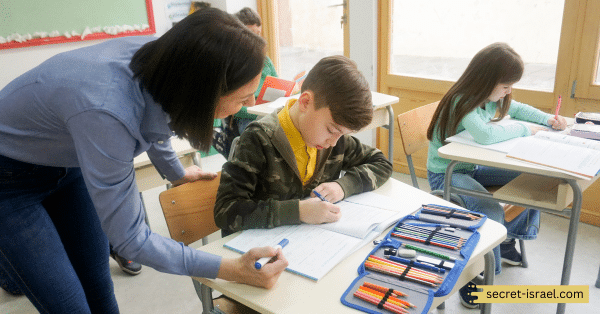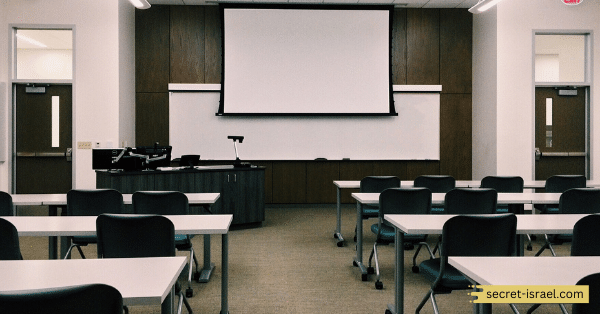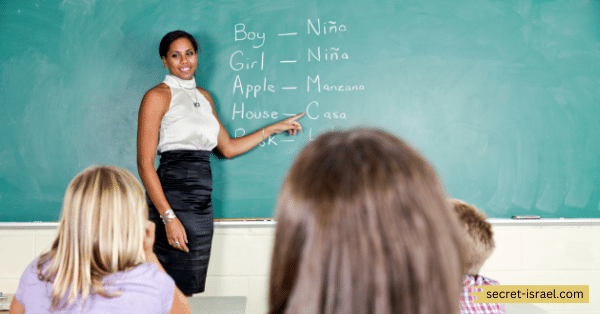Discover the unique characteristics that set Israel’s education system apart. From the three-tiered structure to compulsory education, learn about the exciting and innovative ways this small nation is preparing its students for the future. Read on to explore the intriguing world of Israeli education!
So, buckle up and get ready to discover what makes Israel’s education truly stand out, and how it shapes the minds that continually push the boundaries of innovation.
Compulsory Education
In Israel, education is not only a priority but also a requirement. The Compulsory Education Law enforces that all children from kindergarten to the age of 15, equivalent to the 10th grade, must attend school.
This mandate ensures that every child, regardless of their background, is entitled to a solid educational foundation. The focus on early education is apparent, with an emphasis on fostering curiosity, creativity, and critical thinking skills from a young age.
The compulsory phase consists of primary education (ages 6–12), transitioning into middle school (ages 12–15). This structure paves the way for students to acquire critical knowledge and skills, laying the groundwork for their future academic pursuits and careers.

Teaching Methods
Teaching methods in Israel are designed to stimulate student engagement and foster a love for learning. These methods are a key aspect of the education system, aiming to cater to a diverse array of learning styles and preferences.
- Project-Based Learning (PBL): This method encourages students to learn by actively engaging in real-world and personally meaningful projects. It fosters critical thinking, collaboration, and communication.
- Differentiated Instruction: Teachers in Israel adopt this method to cater to the different learning styles and capabilities of students. This could mean using various teaching techniques within one lesson to ensure that all students grasp the content.
- Cooperative Learning: This method involves students working in groups to achieve a common goal. It helps in developing social skills and promotes a sense of community and teamwork.
- Inquiry-Based Learning: Students here are encouraged to be curious and ask questions. This method places the students in the center of the learning process, allowing them to discover and understand concepts themselves.
- Technology Integration: The incorporation of technology into the classroom is another significant teaching method. From interactive whiteboards to educational software, these tools promote an engaging and dynamic learning environment.
These teaching methods reflect the country’s commitment to developing well-rounded individuals who are not only academically proficient but also innovative thinkers and problem solvers.

Learning Environment
The learning environment in Israeli schools is designed to create a stimulating and inclusive atmosphere that fosters academic growth and personal development. Classrooms are typically filled with natural light to promote a sense of well-being and enhance concentration.
The furniture is flexible and can be rearranged to facilitate both individual and group activities. Alongside the traditional classrooms, schools also offer specialized rooms for art, music, and science activities, encouraging students to explore various fields and nurture their talents.
Outdoor spaces like gardens, sports fields, and playgrounds are not only for physical activities but also used as an extension of the classroom for experiential learning. The incorporation of technology further enhances the learning environment.
Equipping students with the ability to learn independently, at their own pace, and in a manner that best suits their learning style. This holistic approach to the learning environment contributes significantly to the overall success of Israel’s education system.

Technology Integration
Plays a pivotal role in Israel’s education system, transforming traditional classrooms into dynamic learning environments. Whether it’s through interactive whiteboards, online learning platforms, or educational software, technology is infused into everyday teaching, making learning more engaging and accessible.
Teachers leverage these digital tools to deliver personalized and adaptive learning experiences, catering to the unique needs and pace of each student. Meanwhile, students gain valuable digital literacy skills and become familiar with tools and technologies that will be intrinsic to their futures.
Moreover, technology enables teachers to track and assess student progress in real-time, providing timely feedback and enhancing the teaching-learning process. It also fosters collaboration and creativity among students, as they work on shared projects, research, and problem-solving tasks.
The integration of technology in Israel’s education system is not just about keeping pace with the digital era, but also about shaping innovative thinkers, lifelong learners, and future leaders.

Multilingualism
A cornerstone of Israel’s education system, emphasizing the importance of cultural diversity and global communication. Starting from a young age, students are exposed to multiple languages, primarily Hebrew, Arabic, and English.
Hebrew, the country’s official language, is the medium of instruction in most schools. However, recognizing the diverse cultural fabric of the country, Arabic, spoken by a significant percentage of the population, is also taught in schools. This approach fosters mutual respect and understanding among diverse cultural groups.
English, considered a global language, is introduced as a compulsory subject from the third grade onwards. Its proficiency is seen as a key skill for academic success and future opportunities, connecting Israeli students to the broader international community.
The emphasis on multilingualism not only broadens students’ linguistic abilities but also exposes them to different cultures and perspectives. It encourages open-mindedness, enhances cognitive abilities, and prepares students for a globalized world. This aspect further underscores Israel’s dedication to providing an education that is inclusive, diverse, and globally relevant.

Student-Centered Learning
Another integral aspect of Israel’s education system, underlining the belief that every learner is unique and should be at the heart of the learning process. This approach shifts the focus from the teacher to the students, allowing them to take an active role in their own learning journey.
In a student-centered classroom, students are more than just passive recipients of information. They are engaged in hands-on activities, group discussions, and problem-solving tasks, fostering critical thinking and decision-making skills. Lessons are often designed around students’ interests and questions, sparking curiosity and promoting deeper understanding.
Moreover, students are given opportunities to reflect on their learning, set personal goals, and assess their progress. This instills a sense of responsibility and accountability for their learning, leading to improved motivation and self-confidence.
Importantly, the student-centered approach also recognizes and respects individual differences. Instruction is personalized to cater to different learning styles, abilities, and paces, ensuring that all students can achieve success.

In conclusion
Israel’s education system stands out due to its unique blend of compulsory education, innovative teaching methods, a stimulating learning environment, technology integration, emphasis on multilingualism, and a student-centered learning approach.
This combination ensures that students not only meet academic standards but also develop into well-rounded individuals, equipped with the necessary skills to thrive in a globalized world.
Constant evolution, responsiveness to diversity, and a commitment to inclusivity are the hallmarks of this education system, which continues to drive Israel’s success in various fields. As the world of education continues to evolve in the face of new challenges and opportunities, Israel’s approach provides valuable insights and lessons for other countries looking to enhance their own educational landscapes.











